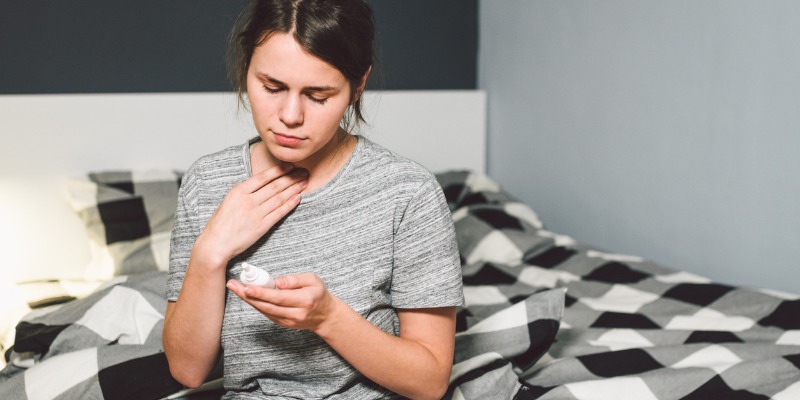
By Shane Creado, MD
Everybody knows that a night of tossing and turning can leave you feeling groggy, crabby, and listless. But did you know that chronic sleep deprivation, or even a single restless night, can also negatively impact systemic inflammation and the immune system? Here’s what we know about the link between sleep and these key areas of health and wellness.
How Sleep Affects Inflammation
A wealth of research has shown that sleep loss activates mediators and markers of inflammation and cell damage. Poor sleep has been strongly linked to inflammation throughout the body—including the digestive tract—in inflammatory bowel disease. One study found that sleep-deprived patients with Crohn’s disease were twice as likely to relapse compared with patients who slept well.
Based on the growing scientific evidence, researchers have begun recommending sleep evaluations to help predict outcomes in sufferers of long-term inflammatory issues.
A Surprising Experiment
I recently met with a cricket player named Ashwin, who suffered from “golfer’s elbow” and wrist tendinitis flare-ups every year. This frustrated him because he was diligent about physical therapy, had been screened for chronic inflammatory and autoimmune disorders, and was an otherwise healthy guy.
In blood tests, his levels of the inflammatory markers erythrocyte sedimentation rate (ESR) and C-reactive protein (CRP) were consistently elevated. In general, this can be related to a number of reasons, such as a poor diet, a chronic skin condition, hard training, or competitive sport.
I heard about this frustrating pattern of injury from his teammate and, as a sleep specialist, I was naturally curious about Ashwin’s sleep patterns. We decided to undertake a little experiment.
- First, we tracked his sleep over a 2-week period then checked his ESR and CRP levels. During this period, I also discovered he had restless leg syndrome, which can disrupt sleep.
- Next, I asked him to extend his sleep for a month, and he averaged about 1.5 hours of additional sleep each night.
- Finally, we re-checked his ESR and CRP levels and found that they were lower than they had ever been.
This was great news for Ashwin. It did not mean that his golfer’s elbow and wrist tendinitis would never recur, but perhaps they would recur less frequently and with less severity.
Ashwin is a good example of how improving sleep may help calm chronic inflammation. Research shows that getting good sleep turns off the pro-inflammatory processes that occur in people with poor sleep and insomnia. Because of this, I would recommend that every person with a long-term inflammatory condition needs to be educated about sleep optimization. And clinicians should make sleep education part of the treatment toolbox they use with patients or clients who suffer from inflammatory issues.
How Poor Sleep Can Sabotage the Immune System
Skimping on sleep or suffering from insomnia can weaken the immune system. A study showed conclusively that in healthy adults who were limited to 6 hours of sleep a night for one week, there was a change in their gene activity profile relative to when those same individuals were getting a full 8 hours of sleep a night. A total of 711 genes were distorted in their activity, caused by a lack of sleep. About half of those genes were actually increased in their activity, while the other half were decreased.
The genes that were switched off by a lack of sleep were genes associated with the immune system (which indicated an increased risk of infection). In contrast, those genes whose activity levels were increased by way of a lack of sleep were genes associated with the promotion of tumors, long-term inflammation, stress, and—as a result—cardiovascular disease, atherosclerosis, stroke, dementia, and other conditions directly associated with inflammation.
Even a small loss of sleep has been shown to impair immune function. One large 2-week study monitored the development of the common cold after giving people nasal drops with the virus that causes colds. (I think that was rather sadistic!) They found that those who slept less than 7 hours were almost 3 times more likely to develop a cold than those who slept 8 hours or more.
In a study where participants were restricted to four hours of sleep for a single night, there was a 70% drop in natural killer cell activity. These cells play a critical role in immunity, especially in fighting tumor cells and virally infected cells.
For all of these reasons and especially with the current coronavirus outbreak, it’s more important than ever to encourage patients and clients to make sleep a priority.
About the Author: Shane Creado, MD, Amen Clinics Chicago
Dr. Shane Creado is a board-certified sleep specialist, who works not only on the treatment of sleep disorders but also on perfecting and optimizing sleep. He is the host of the Overcoming Insomnia course, which teaches the best evidence-based strategies to improve sleep. Dr. Creado is also the author of Peak Sleep Performance: The Cutting-Edge Sleep Science That Will Guarantee A Competitive Advantage, available on Amazon.
This book is primarily geared toward coaches, trainers, and elite athletes, but this step-by-step guide to sleep optimization can also be beneficial for anybody who wants to boost their brain health and productivity. For updates about the book, free sleep tips, as well as special offers, follow @peaksleepperformance on Instagram.





No Comments »
No comments yet.
RSS feed for comments on this post.
Leave a comment